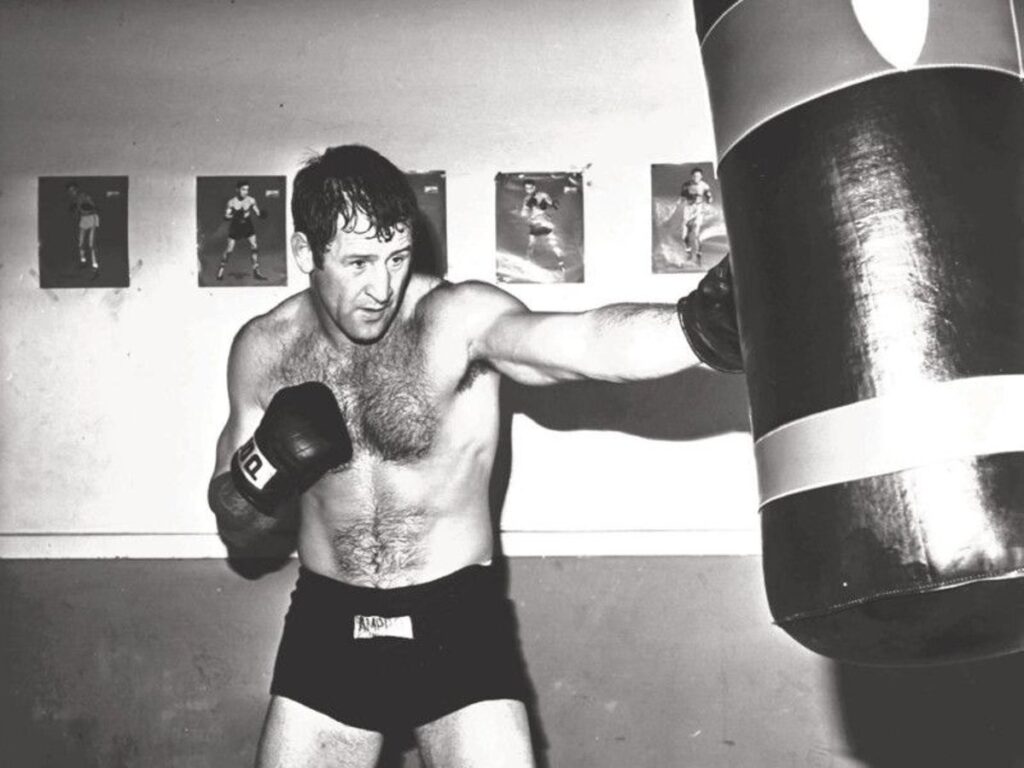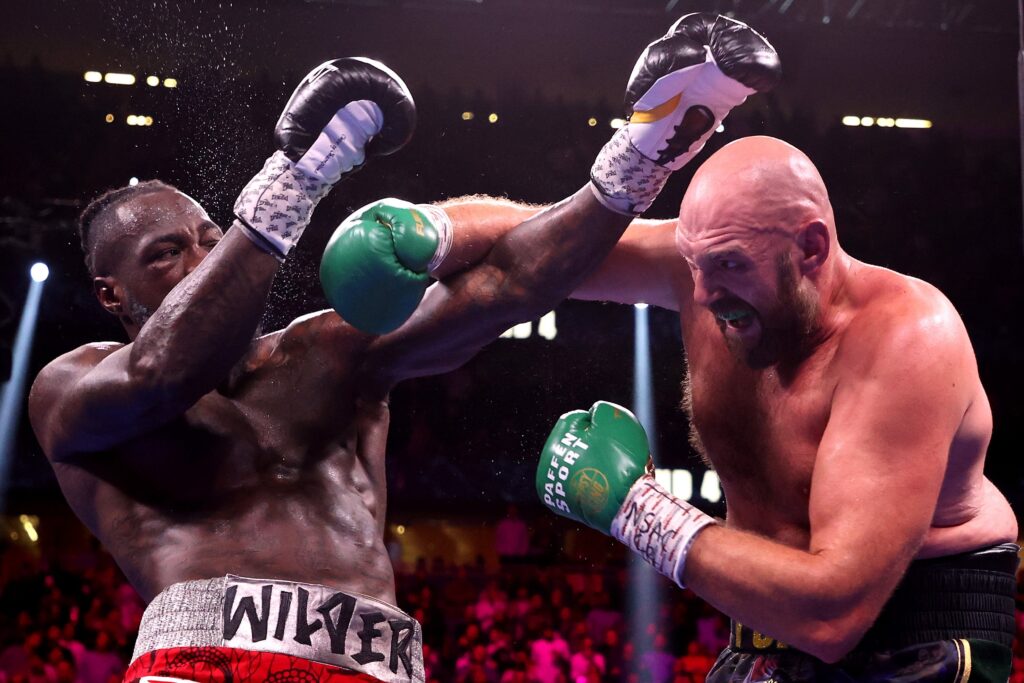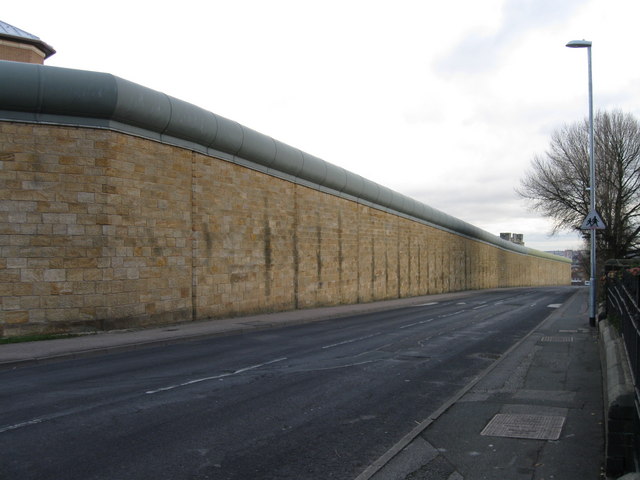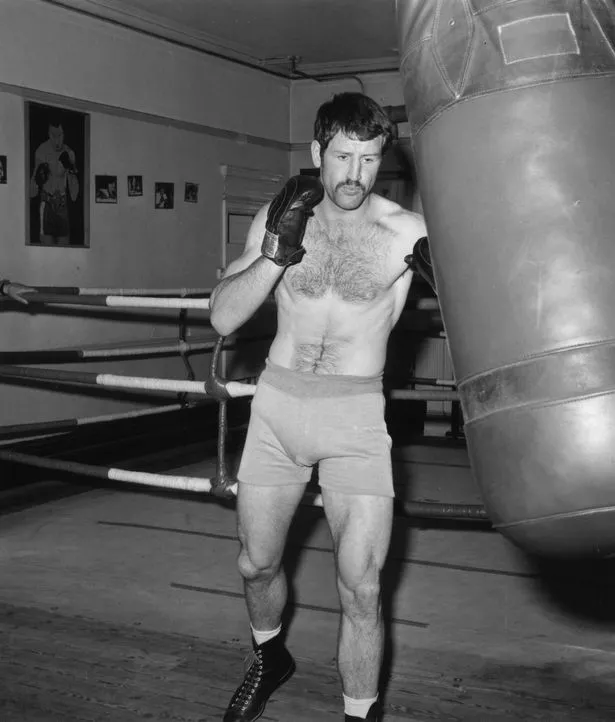Boxing Career
Professional Ambitions

Since he’d started boxing all those years ago, Paul had always had ambitions of turning pro. In 1973, he competed in the ABA (Amateur Boxing Association) championship. He was quite successful in this tournament, reaching the semi-finals, and even though he hadn’t won, he’d showcased his talents to everybody there. Boxing promoters now knew the name Paul Sykes, and a future in professional boxing was suddenly more than just a fantasy.
Upon competing in the ABA’s, he applied for a professional boxing license. Much to his disappointment though, because of his extensive criminal record, the boxing committee refused his application, however, he was told that he could reapply in the future.
This was a major setback for Paul, and rather than try to prove he was a reformed man, he was soon back in prison on a five-year sentence for robbing a bookie, the same sentence which separated him from Pauline and their baby.
Tommy Miller
He served four years of that five-year sentence. Before he was sent down, he built a connection with a boxing manager who promised him that, when he got out, the next time he applied for a license, he wouldn’t be denied. Tommy Miller, a notorious figure in the national boxing scene, had taken a shine to Paul; he offered to manage him when he turned pro.
Tommy was well known in boxing for all the wrong reasons. He was somebody who overmatched his fighters, pitting them against tough opponents too soon, thus putting their careers to a halt.
But Paul was an educated man who was smarter than he looked. He was well aware of the seediness of Tommy and vowed that this man wouldn’t make a mockery of him. Tommy had a lot of sway within the boxing committee because he was a member, and if he said he could get Paul his license, then Paul knew it would probably happen, so he had to take a chance.
When he left prison in 1977, Paul thought that, straight away, his license would be granted, and his career would take off. This wasn’t to be the case. Tommy told the habitual criminal that he had to keep his nose clean for six months before the committee would allow it.
To Paul, this was a greater challenge than any he would face in the ring. He was too impulsive and used to a life of crime. He couldn’t think long term. Heck, he could hardly get through today without a scrap. So how was he to survive on the outside as an upstanding citizen for an entire six months? The answer was – he couldn’t.
Dedication to Training
Initially, Paul dedicated his time to training, so that when he got his license, he would be ready for his first fight. He was thirty years old, and for that era in boxing, was considered too old of a fighter to be taken seriously. Nowadays, boxers have a much greater longevity, but in the 1970s, a thirty-year-old was seen as a stepping stone for younger fighters out for an easy win. But one advantage Paul had over every other heavyweight in the country was his size.

In comparison with today’s heavyweights like Tyson Fury, Paul was tiny in stature, but in the 1970s he was considered huge. At six-feet-three inches and fifteen-stone two-pounds, he was a physical specimen to behold – all of it pure muscle somehow built on a prison diet of porridge, bread, and water. He shouldn’t have been as strong and muscular as he was, but luckily for Paul, he’d been gifted with good genes, and he wasn’t going to allow his age to be his flaw.
Each day he would go down to the local boxing gym to spar with local talent. He was known for being a formidable sparring partner who put the young budding fighters to the test. He became so recognised for his sparring ability that, one time, the mighty Joe Frazier’s team handpicked Paul to spar with the heavyweight champion.
All this sparring served him well, and he maintained a meticulous level of fitness throughout those six months. He was confident in his abilities, thought he could beat anyone, and knew that, despite his age, he would make his mark on the boxing scene upon his introduction.
Habitual Criminality
But one thing Paul couldn’t do was stay out of trouble and he was soon back committing crimes. He auctioned counterfeit jewellery in different parts of the country. He was arrested continually for these unlicensed auctions, but managed to plead his case in court, and got away unscathed.
His drinking didn’t stop completely either. Although he was training hard and being strict on his indulgences, he still got obliterated on alcohol whenever it took his fancy.
This came close to ending his career before it had even started, when, one night, while smashed, he got into an altercation with a childhood friend, and bit a chunk out of the poor man’s ear. He was arrested for the crime and placed on remand for GBH. He had time to sit and ponder, wondering how badly he had messed up.
Tommy Miller was furious at Paul for dampening his chances at getting a license, but Paul, ever confident in his ability to beat the law, told Tommy that his old friend wouldn’t press charges, and he would get off with the crime.
He was right. His friend did indeed tell the police he didn’t want to press charges, and Paul was freed from prison a few weeks later. However, even without the victim’s consent, the police were still going to go ahead with the case, because, as we will soon find out, they weren’t too happy with this known troublemaker trying to make something of himself.
When the six months were over, Tommy pulled some strings and got Paul his license. This was to be a pivotal moment for him, and the beginning of probably the most lucrative period of his life.
First Fight Failure
10th October 1977 – not long after obtaining his license – Paul was listed for his first professional fight. He was ready. He’d trained intensely for four long years to prove his worth. Fame and glory awaited him. This was his time to shine.
That fated morning came. In his parents’ house, as he got ready for the fight; with his dad crying tears of happiness, so proud of his boy turning pro; there was a long, hard, rat-tat-tat at the front door – a knock which Paul instantly recognised as being the police.
They had come to arrest him for being party to an operation of stolen turkeys. They had waited until the morning of his first fight just so they could ruin his starring moment.

He was driven to Armley Prison and placed on remand for ten days. His fight was cancelled, the start of his career put on hold, and all Paul could do was stew in his cell and hope to beat the rap once again.
Luckily, he managed to beat the case. When the star witness for the prosecution was unravelled as an ex-girlfriend out for revenge, he walked free from court, but now he had to wait for another fight.
A Second Chance
It took Tommy another four months to find him an opponent. Another four long months to keep his nose clean. He resented waiting. He couldn’t admit himself at fault. It was always everybody else trying to stitch him up.
Finally, though, Tommy found him his second chance at a first fight. His opponent was to be a Barnsley native called, Keith Steve Johnson. The date of the fight was set for 20th February 1978, three months before Paul turned thirty-two.
Keith Johnson was a complete mismatch for Paul. He’d had fourteen previous fights and only won three. He was a poor fighter with no notable talent. Just a sacrificial lamb to help kickstart Paul’s career.
It would be the final fight of Keith Johnson’s own short-lived career. I guess after the way Paul humiliated him, he decided to hang up his gloves prematurely. Paul pummelled him so badly in the first round that he knocked Keith to his knees. He took a barrage of punches to the face and body that he was unable to stop. When the bell was rung at the end of the first round, after a short deliberation, Keith decided to throw in the towel.
Paul had won his first fight without breaking a sweat. Once he’d been named victor, he was interviewed for television by famed broadcaster, Fred Dineage.
If you watch that interview, you can see Paul’s unique charisma on display. When asked what’s next for his career, Paul jokingly states, ‘My second professional fight, then me third, then me fourth, then like, rows of shops, blocks of flats, holiday villas, seven hundred and fifty birds like Joe Bugner…’
You had to admire his confidence.
Disqualification

Paul’s second fight wouldn’t go so smoothly. In fact, he brought his first act of shame on his career. His next opponent was a fellow Wakefield native. A man called, Neil Malpass.
Neil had had sixteen previous fights and won them all apart from three, with most of his wins being by knockout. He too had fought Keith Johnson and knocked him out with ease. He was a much more capable fighter than Johnson, and a much tougher challenge for Paul. If Paul could win this fight though, it would prove that he had the skills to be a national talent.
Paul was confident he’d win. His ego held no bounds. He went into the fight certain of a victory over this skinny kid from South Elmsall.
Again, due to police harassment, the second fight almost didn’t happen. He was dragged to court that morning for the GBH charge against his friend. Fortunately, though, when his friend took the stand and refused to grass on Paul, he skipped free from court, and was able to make it for his fight.
Still, it wasn’t to be. Neil Malpass outboxed the braggart. It was the first sign of Paul’s weakness inside the ring. If he couldn’t pummel an opponent inside the first three rounds, if they managed to defend his punches and tire him out, he would run out of ideas, and quickly lose his steam.
When Paul realised he couldn’t overcome Malpass the same way he had Johnson, he did something cowardly to end the fight. In the seventh round, Sykes headbutted his opponent and was instantly disqualified, and Malpass was crowned the victor. Later, when asked why he had done such a thing, Paul jested, ‘My corner told me to start using my head, so that’s what I did.’
This was a major embarrassment that could have ended his career. But even so, he was a star attraction who sold-out venues, therefore boxing promoters wanted to keep him fighting despite his lack of dedication. For his third and fourth bouts, he was thrown in the deep end, fighting two of the top-five heavyweights in the country.
Redemption
These fights, although on paper, should have been tough, helped salvage his reputation. In the third fight, he beat opponent, Tommy Kiely, on points. His fourth fight, against opponent, Neville Meade, was won by TKO in the fifth.
After two successive wins, Paul now had a chance at redemption. Somehow, he’d managed to climb the national heavyweight rankings into second place. He was listed to fight Neil Malpass again, but this time, at The Theatre Club, in their home city of Wakefield.
Rematch
A buzz swept over the city. Anticipation was felt by fans of both fighters; everybody in Wakefield wanted a ticket. Police officers, prison guards, even victims of Sykes yearned to get a seat. Maybe they attended in the hopes that he would be battered, but it didn’t matter to Paul, he revelled in his local celebrity status.
Prisoners he’d done time with sat in their cells and tuned their radios into his fights; he was finally a somebody for all the right reasons, his reputation as a criminal had been polished by this turnaround into professional boxing.
So, in front of a crowd full of adoring fans and haters out for his blood, Paul again went toe to toe with the skinny kid from South Elmsall.
This time, he performed much better, and managed to go the full ten rounds. When the fight was over, the referee hesitated, then raised both opponents’ arms. The fight was declared a draw much to everyone’s surprise.
Many spectators refuted this decision. They said that Malpass had outboxed Paul again, and he deserved the win. Some say that the referee had been forced to declare it a draw, coerced by the powers that be so that Paul could keep rising the ranks due to his bankability.
We will never know for sure, but now that Paul had somewhat redeemed himself, his next opponent would be a heavyweight from across the seas, an American called, Dave Wilson. And this fight would be one that would haunt him forever.
The Fight that Haunted Him
He trained even harder for this fight. At a sparring session prior to the big day, Paul was interviewed for TV once again. Panting, and out of breath, he proclaimed, ‘I’ve got to win it in great style, I’ve not just got to win, I’ve got to really sma– the business.’
What I think he meant to say was, ‘I’ve got to really smash him’, because smash the American he did. He dominated the fight. In the third round, Wilson fell against the ropes, and Paul unleashed on him a fury many of his victims must have experienced. As Wilson laid limp on the ropes, Paul continued to strike him repeatedly in the head until the ref broke it up and promptly ended the fight.

Paul was declared the winner, but celebrations were cut short when Wilson wouldn’t stir. The American was carted away on a stretcher and raced in an ambulance to Pinderfields Hospital.
Paul had almost killed him. He suffered a brain haemorrhage from the punches to the head, but fortunately, due to instant medical attention, he managed to survive, albeit he was in a coma for fifteen days.
Paul went to visit him every day he was in a coma. He felt traumatised by the situation, knowing he’d almost killed a man. He was so ridden with guilt that, when the American woke up and had to be discharged from hospital, he allowed him to stay at his house until he fully recovered.
But Dave Wilson never truly recovered. That would be the last fight of his fleeting career. He went back to America and never fought again because of the injuries induced by Sykes; he became just another victim of his violence.
Manny Goodall & Don King
But Paul Sykes was now on a fast-track to challenge for the British & Commonwealth Heavyweight titles. A renowned promoter of the time wanted to represent him. Another dodgy personality by the name of Manny Goodall.
Manny was somebody who Paul never liked. He had a sleaziness that Paul thoroughly despised. He told Paul he would fly him to America where he could really make a name for himself. He introduced him to Don King (another infamous promoter he didn’t favour) and they both told Paul he would eventually come to train in the States. These plans, at first, didn’t come to fruition. Something or other made them fall through.
He fought a further two times before going to America. Two opponents that were again mismatched. He wasn’t happy about either fight. He made that apparent. He stopped training as hard, began to drink more, and was taking prescription drugs.
Seventh & Eighth Fights
A Congolese man, Lisimo Obutobe, was his seventh opponent. In the sixth round, Paul knocked him out. Memories of his last fight came back to haunt him. When the African hit the deck, he panicked he might have killed a man again. Thankfully, Obutobe was found to be okay. This made Paul breathe a sigh of relief. He never wanted to repeat what had happened to Dave Wilson.
His eighth fight against American, Conrad Tooker, didn’t end in a KO. It went the full ten rounds. On paper, he should have easily won; Tooker was two stones lighter than him. But there was a reason for this, Paul confessed. He’d consumed a lot of sleeping pills the night before the fight.
He thought it so despicable he was pitted against a man much smaller than him; boxing promoters were using them both; he thought they must have wanted him to kill.
He turned up groggy, his motor-functions hindered; he refused to take the fight seriously. Despite his anger and semi-intoxicated state, somehow, he fought through, and managed to win on points, but not without the American making a wreckage of his face.
Going to America
Paul’s former adversary, Neil Malpass, had been carded to challenge the British & Commonwealth Heavyweight Champion, John L. Gardner, for his titles. But unfortunately, when Malpass was involved in a serious car accident, the fight had to be abandoned.
Now, Gardner needed a new opponent to fight him at Wembley. Due to Paul’s successive wins, he became that man. It’s a record still held to this day – a title contender with the fewest number of fights. Only eight previous bouts, and at the age of thirty-three, Paul would get his chance to enter the British boxing hall of fame.
Manny finally came through on his word. He sent Paul to America to get the best training possible for his upcoming fight. He would spar with Leon Spinks, somebody who, the previous year, had upset the great Muhammad Ali, beating him by unanimous decision, although, they had done battle again a few months later, and Ali had exacted his revenge.

Paul hated his time in America. He hated Spinks. He hated everybody involved at the training camp. They had him running day and night. Miles and miles. They had him doing so much cardio, he lost seven pounds. He left the camp early, furious at the lies he’d been fed by Manny Goodall.
Back in Britain, people say Paul didn’t train properly for the fight. He was drinking heavily, not managing his diet. The biggest fight of his life and he didn’t seem to care. But would it have mattered? If he’d been younger, maybe he would have had a chance. But in the end, John L. Gardner was just too good of a boxer.
The British & Commonwealth Heavyweight Title Fight
The morning of the fight, 26th June 1979, Paul’s shady doctor gave him a shot of something which Paul would later blame for his loss, professing that it discombobulated his senses. Experts discount this. Truthfully, Paul was just outboxed.
John L. Gardner wasn’t a big man, but he was a master at defence. Paul was several inches taller than him, and although below his usual weight, he still had a greater presence over John. This handicap didn’t matter. Gardner knew that Paul would give it his all inside the first three rounds, try his hardest to knock him out. He’d watched replays of the Malpass fight and knew that if he just hung on like Malpass had, Paul would run out of energy and ideas, and then the fight would be his.
His plan worked. John took all of Paul’s might and wouldn’t break. Paul soon realised he had no way to beat the British Champion. After six rounds, lethargic, and without any hope, Paul committed his final act of cowardice, which, this time, would bring an untimely end to his boxing career.
He turned his back on Gardner. An illegal action. The most shameful thing a boxer could do. Gardner was crowned the victor, retained his titles, and Paul’s own career was left in tatters after that cowardly decision.
End of a Short Career
He fought once more in Lagos, Nigeria, against, Ngozika Ekwelum. Unsurprisingly, he was knocked out in the first round. The final nail in the coffin, a fight which, after his loss to Gardner, nobody paid any attention. Some say Paul was made to throw the fight. Others say he just wanted his purse so he could go and get drunk.
Either way, it was the bitter end to a lacklustre legacy. One which he had strived for all his life, yet ultimately, hadn’t resulted in anything but shame. He achieved more than most. At his age, he certainly proved everybody wrong. He tried. He contended. He poured blood and sweat inside the ring.
Between 1978 and 1980 he fought ten bouts, won six, drew one, and lost three. But after just two short years, it was all over. Just like that, everybody forgot about him. That was, apart from his old acquaintances – the police, prisoners, and people of Wakefield – because soon, upon the end of his boxing career, Paul spiralled, and was sent back to prison for five years for intimidating a union official.
2 responses to “Paul Sykes – A Life of Chaos – Part 4”
[…] Previous… Next… […]
[…] Previous… Next… […]